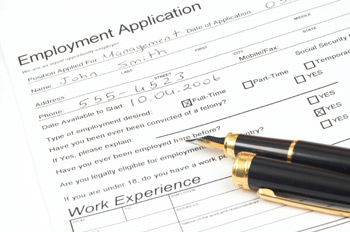To apply or not to apply?

Barry Whelan of Excel Recruitment advises applicants to have relevant skills before applying for a job to give oneself a chance of securing a particular position
15 December 2010
 One frustrating but common predicament job seekers encounter is deciding whether or not to apply for a job if they don’t meet the employer’s qualifications. It is a frustrating but frequent occurrence many people can relate to.
One frustrating but common predicament job seekers encounter is deciding whether or not to apply for a job if they don’t meet the employer’s qualifications. It is a frustrating but frequent occurrence many people can relate to.
We hear so many complaints of job seekers dismayed because they are not even getting a response to an application, let alone an interview, and one has to question is this because the roles to which they are applying, they are simply not qualified for.
While browsing job postings, you see a job that has the responsibilities and duties that match your interests. The day-to-day role is exactly what you’ve been hoping to find. Then you see the minimal requirements and, although you have some of the necessary skills and plenty of passion, you don’t have the qualifications the company demands.
Perhaps you have three years of relevant experience, not five. Or you have a bachelor’s degree, not a master’s. You’ve been in a managerial role but in a different industry. You know you can do the job, but you don’t know if you’ll even be considered without satisfying each of the requirements.
Should you apply?
The decision to apply seems like an obvious choice. On the surface, you have nothing to lose by submitting your CV and everything to gain if you are called in for an interview. Yet, you need to look beyond the immediate outcomes and ask yourself a few questions.
Firstly, how close are you to being qualified?
In today’s environment, most recruitment managers won’t consider any applicant who doesn’t meet the minimum requirements; even if they are a perfect fit bar having too few years of experience. However, many recruitment managers will look at all the candidate has to offer, so the right education, work history and skills can make up for other shortcomings. Give yourself an honest estimate of how close you are to the employer’s ideal applicant.
Secondly, am I wasting the employer’s (and my) time?
Wanting the job — even if you’re a quick learner — is significantly different than being qualified and capable. A job seeker with years of experience in another industry might be a skilled worker, but that doesn’t necessarily translate to a good match for this job. Use your cover letter and CV to make a strong case for your ability to do the job, otherwise the recruitment manager won’t view you as a serious candidate.
Lastly, do you have a plan?
Taking the previous two points into consideration, ask yourself what your next step is. If you are one course from completing your degree and being qualified for this job (and others like it), will you return to education next year? Is working for this specific company a priority?
If so, you don’t want to repeatedly apply for jobs until the HR department has flagged you as a nuisance. Instead, only apply to jobs for which you are a contender. Take some time to gain experience and skills that give you the right qualifications. As frustrating as the long process might be, it can transform you from a long shot to a front runner if this particular industry or company is important to you.
Look at the situation from the employer’s perspective
According to a recent CareerBuilder survey, only 18% of hiring managers spend more than two minutes looking at a résumé and five percent spend 15 seconds or less. You need to make a positive impression quickly if you want to get noticed for any job, but especially for one where your qualifications fall short of the employer’s expectations.
Imagine yourself sitting on the other side of the desk and look at your CV and cover letter from the boss’ perspective. If you were choosing from the pool of applicants, would you pick your application out of the pile or would it go in the waste bin? Consider some of the ways you could boost your chances of landing an interview and eventually the job:
Get referred
If you have a friend, colleague or relative who works at the company or knows the recruitment manager, ask them to refer you for the position. A personal referral is one of the most effective ways to distinguish oneself from the stack of CVs.
Don’t leave room for doubt
Don’t send a cover letter that apologises for your shortcomings. Instead, give examples of how your experience is relevant to the position. Rather than make broad statements about what you could do for the company, cite specific statistics or accomplishments.



 Print
Print






Fans 0
Followers